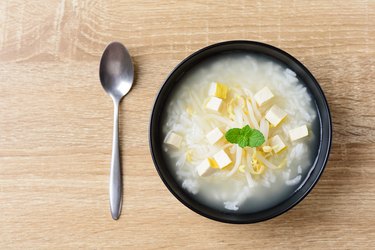
Unprocessed or minimally-processed soy has several potential health benefits. But there doesn't seem to be a connection between soy products such as soy milk and menstrual cramps. Soy is not likely to help your menstrual cycle, but it is also not going to put you at greater risk for breast cancer.
What’s in Soy?
Video of the Day
Soy is a type of legume. It is native to Asia, and plays a major role in much Asian cultural cooking. You can get both whole and processed forms of soy.
Video of the Day
Whole soy includes whole soy beans, soy milk, and tofu, which is often found as a meat replacement in Asian cuisine. Processed soy products include meat replacements, yogurts, cheese, fermented soy and supplements.
Soy contains several nutrients that are good for you. According to Colorado State University, some of the nutrients include fiber, protein, several vitamins and minerals, healthy fats, antioxidants and phytochemicals. If you are vegetarian, the protein in soy can help replace meat products in your diet.
Read more: Soy Protein vs. Meat Protein
You should keep in mind soy is not good for everyone. Some people are allergic to soy, which can cause severe immune responses to eating soy and soy products. Others may experience soy protein intolerance syndrome. The syndrome can cause gastrointestinal gas and cramps.
Read more: Soy Protein Intolerance Symptoms
Phytochemicals are the main source of interest for researchers. Phytochemicals are compounds that are very similar to estrogen, but produce weaker effects on your body. Though phytochemicals and soy may be beneficial, studies are mixed.
What the Studies Say
According to Harvard University, there are several issues with the existing studies on soy. They identified four issues that make it difficult to come to a conclusion about the effectiveness of soy on your health. These factors include:
- ethnicity of the people in the study
- hormone level differences between those who are pre- and post-menopausal
- types of soy
- whether the study used humans or animals
A recent study published in Toxicology Research in November of 2017 found that high concentrations of phytochemicals may have an effect on breast and endometrial health, as well as on fertility. However, they indicated that more research is needed, because their study used high concentrations in a laboratory setting.
In January 2020, researchers published findings in The Journal of Nutrition regarding the effects of phytoestrogen on increasing fertility in North American and Danish women (the language used in the study). The study found that phytoestrogen had no effect on whether or not the study participants became pregnant.
According to Colorado State University, soy does not seem to have much of an impact on menopause symptoms either. They state that studies have shown mixed results, with people experiencing hot flashes and other signs of menopause. They recommend consuming soy in moderation, for other dietary health benefits.
Some people may associate phytoestrogens and heavy periods. But unfortunately, there are very few studies about how eating soy, or drinking soy milk, affects the menstrual cycle directly. Therefore, it is possible, but not likely, that you will experience changes in your menstrual cycle when you eat soy. However, if you eat soy, you may still find benefit from the nutritional content of the beans.
For example, soy is high in dietary fiber. According to the Academy of Nutrition and Dietetics, you need 25 grams of dietary fiber each day. Dietary fiber can help reduce the amount of fat you digest. It can also help with making you feel fuller, which can help you eat less food during meals.
- Colorado State University: "The Pros and Cons of Soy for Women"
- Harvard University: "Straight Talk About Soy"
- Toxicology Research: "Modulation of Estrogen Synthesis and Metabolism by Phytoestrogens in Vitro and the Implications for Women's Health"
- The Journal of Nutrition: "Dietary Phytoestrogen Intakes of Adult Women are not Strongly Related to Fecundability in 2 Preconception Cohort Studies"
- Academy of Nutrition and Dietetics: "Easy Ways to Boost Fiber in Your Daily Diet"
Is this an emergency? If you are experiencing serious medical symptoms, please see the National Library of Medicine’s list of signs you need emergency medical attention or call 911.